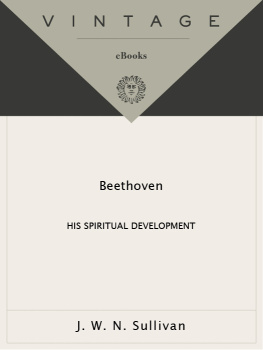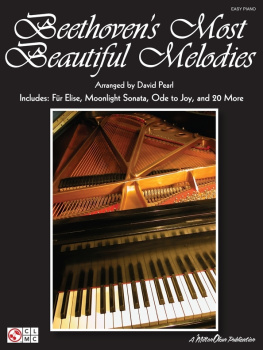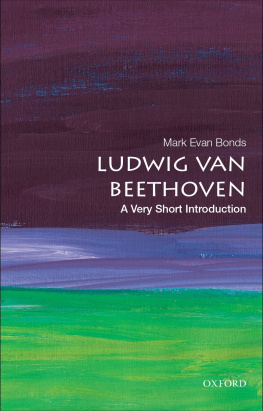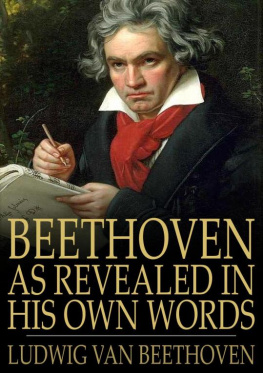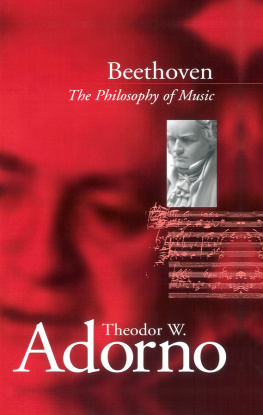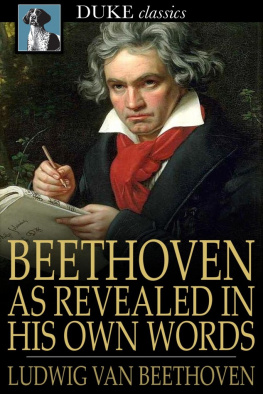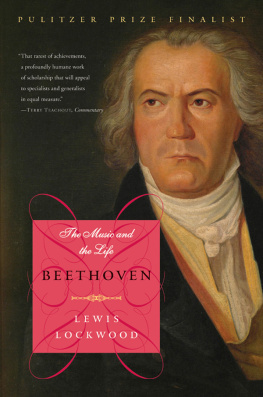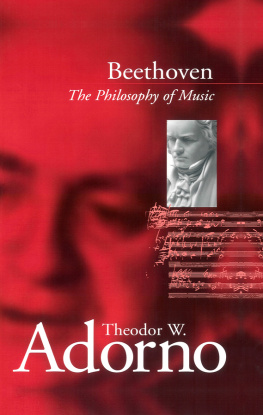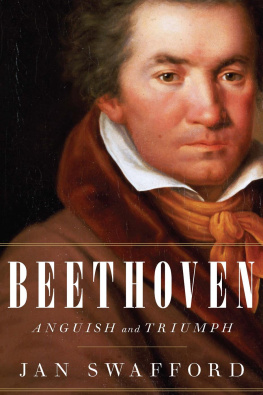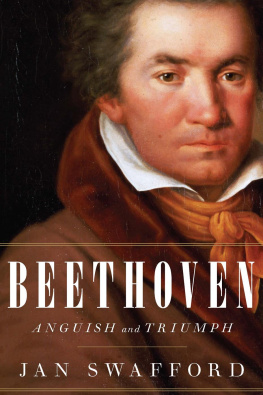VINTAGE BOOKS EDITION 1960
Copyright 1927 by J. W. N. Sullivan
Copyright renewed 1955 by E. V. Sullivan
All rights reserved under International and Pan-American Copyright Conventions. Published in the United States by Random House, Inc., New York.
eISBN: 978-0-307-82374-8
v3.1
TO
Vere Barbrick-Baker
Preface
B EETHOVENS music may be studied from many different aspects, but in this book I am concerned with one aspect only. From the technical point of view Beethovens music can still yield rich finds to properly qualified searchers, as some of Dr. Toveys magnificent essays abundantly prove. Also, Beethovens influence on other composers is a study on which the last word has by no means been said. Again, Beethovens music may be used to throw light on certain of his characteristics, his amazing constructive power, his dramatic sense, his humour, his impulsiveness, etc. etc. But in this book I am not primarily concerned with any of these aspects of his work. I am concerned with Beethovens music solely as a record of his spiritual development. I believe that in his greatest music Beethoven was primarily concerned to express his personal vision of life. This vision was, of course, the product of his character and his experience. Beethoven the man and Beethoven the composer are not two unconnected entities, and the known history ofthe man may be used to throw light upon the character of his music. This does not mean, of course, that successive compositions reflect successive incidents in his life. The life-work of a great artist is not some kind of sumptuous diary. But Beethovens attitude towards life was largely conditioned by certain root experiences. Such experiences do not happen once for all. They have a life of their own, and they continue to modify the mans whole attitude towards life. They become combined with other experiences and form elements in continually more complex synthetic wholes. The development and transformation of Beethovens attitude towards life, the result of certain root experiences can, I believe, be traced in his music. As the assumptions underlying this point of view conflict with ideas on the nature of music still held in some responsible quarters, I have devoted a preliminary section to a discussion of the general question.
For such biographical details as I have used in this work I am chiefly indebted to Mr. Krehbiels edition of Thayers Life of Beethoven. The interpretations given to the compositions I discuss are my own, but I have been much gratified to find that certain other writers have expressed similar ideas. Even when the ideas are worded very differently, it can be seen that the same fundamental experience of the composition is being expressed. No such interpretations can claim universal validity. The utmost they can do is to suggest to the reader that the authors experience of the composition is similar to his own. Such additional coherence and systematization as the author has given to his ideas may then be found profitable.
Beethovens music, much more than that of any othercomposer, inevitably prompts the kind of reflections that are contained in this book. Thus Mr. Ernest Newman has said, It is the peculiarity of Beethovens imagination that again and again he lifts us to a height from which we revaluate not only all music but all life, all emotion, and all thought. This peculiarity has long been recognized as the function of the greatest literature. It is also, we may believe, the function of the greatest music, although it performs that function in a very different way, and even if Beethovens music be the only music sufficiently powerful to exercise it unambiguously.
J. W. N. S ULLIVAN
Chobham, 1927
Contents
BOOK ONE
THE NATURE OF MUSIC
BOOK TWO
BEETHOVENS SPIRITUAL DEVELOPMENT
BOOK ONE
The Nature of Music
CHAPTER ONE
Art and Reality
O N MAY 28, 1810, Elizabeth Brentano, a young woman who is described as having been beautiful, highly cultured and fascinating, wrote a letter to Goethe describing her meeting with Beethoven. In the course of this letter she professes to report a conversation with Beethoven and attributes to him the following remarks:
When I open my eyes I must sigh, for what I see is contrary to my religion, and I must despise the world which does not know that music is a higher revelation than all wisdom and philosophy, the wine which inspires one to new generative processes, and I am the Bacchus who presses out this glorious wine for mankind and makes them spiritually drunken. When they are again become sober they have drawn from the sea all that they brought with them, all that they can bring with them to dry land. I have not a single friend, I must live alone. But well I know that God is nearer to me than to other artists; I associate with Him without fear; I have always recognized and understood Him and have no fear for my musicit can meet no evil fate. Those who understand it must be freed by it from all the miseries which the others drag about with themselves.
Music, verily, is the mediator between intellectual and sensuous life.
Speak to Goethe about me. Tell him to hear my symphonies and he will say that I am right in saying that music is the one incorporeal entrance into the higher world of knowledge which comprehends mankind but which mankind cannot comprehend.
On the following day, when Elizabeth showed Beethoven what she had written he exclaimed, Did I say that? Well, then I had a raptus!
But the question is whether Beethoven said any of it at all. It is an unfortunate fact that the fascinating Elizabeth was not a perfectly truthful person. Even her champion, Thayer, admits that she was not above forging documents, or parts of documents. And the remarks attributed to Beethoven in this letter certainly differ in style from anything to be found in his writings. Schindler, the constant associate of Beethoven in his last years, stated that he had never heard the master talk like it. On the other hand, Beethoven was at this time only forty years of age; he had not yet entered into the silence of his last years. And Elizabeth was indisputably far more intelligent and responsive than Schindler. Moreover there are certain points about the report which, when examined, are seen to be characteristic and such as would be difficult to invent. The reasonable hypothesis is to suppose that Beethoven did make certain claims for his music and that Elizabeth, very romantic and somewhat unscrupulous, gave them what she thought was an effective presentation.
The point is important because in this report is almost the only evidence we have as to Beethovens conception of the function of music. It is a conception which was not consonant with the intellectual outlook of his own time, and which is, indeed, incompatible with the general intellectual climate of the last three centuries. We may assume, as the irreducible minimum basis of Elizabeths fantasies, that Beethoven regarded art as a way of communicating knowledge about reality. Beethoven was a firm believer in what Mr. I. A. Richardsideas about his music, is not unimportant. It seems easy for some writers, men of quite average sensibility and intelligence, to dismiss the testimony of the greatest artists to the meaning of their own work when this testimony conflicts with the philosophy the critic has found adequate to accommodate his own experience. Such an attitude shows a pathetic confidence in the validity of established truths. A certain humility in the presence of utterances which presumably spring from a richer context of experience than we possess is surely to be excused. So that we may sympathize with Goethe when he replied to Elizabeths report of Beethovens conversation:

